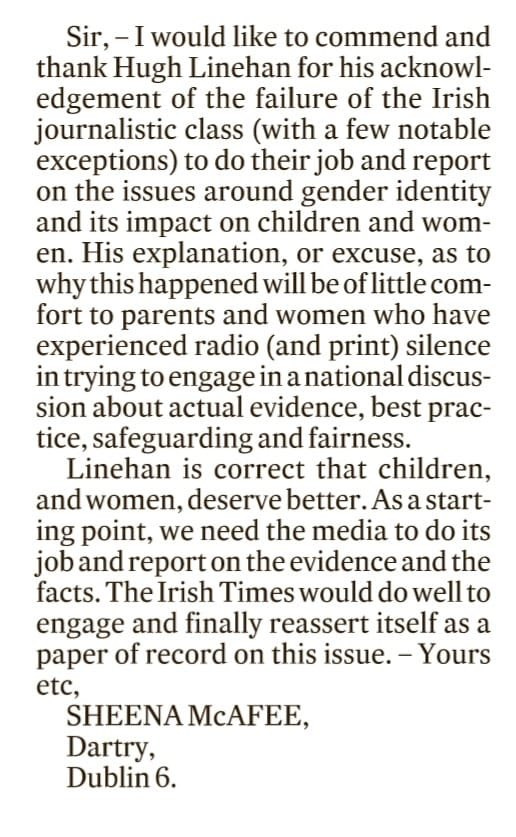The Ripple Effect: From Silence to Stirring
There was a time when speaking openly about gender issues felt like shouting into the void. The silence was near total but now things are FINALLY changing
Even though the UK has been in turmoil over trans issues for years, with whistleblowers emerging from the Tavistock and a series of legal battles raging, the Irish media kept its head firmly down. But now, it finally seems to be finding its spine. And more than that, unlikely voices are starting to speak up, and I reckon we should welcome them all with open arms.
It began, for me, with an interview. I spoke with Ian O’Doherty on his podcast The State of Us about the cultural shift in gender identity politics, the chilling effect of cancel culture, and the strange silence in Irish media. From there, I wrote a Substack piece that caught some attention, including from Hugh Linehan of the Irish Times.
Linehan’s piece, “Why is Irish media so reticent about covering gender issues?” published on June 10th in the Irish Times, was a tentative but significant shift. It wasn’t an endorsement of my position, nor was it a full-throated defence. But it was something rare and important, an honest acknowledgement that the Irish media has failed to grapple with the realities of gender medicine, particularly where children are concerned.
“Irish journalism like Irish society, is small. The circles are tight. The cost of stepping on the wrong third rail – socially, professionally, reputationally – is high. Better, perhaps, to look away.”
Linehan referenced my recent writing and podcast appearance, quoting my observation that the Irish press had been curiously silent on major developments like the Cass Review, the closure of Tavistock, and the Forstater ruling. While stopping short of full agreement, Linehan admitted my broader point was hard to dispute. Irish journalism has not done its job.
This was a small but significant rupture in what had been, for years, a sealed vault.
In response to Linehan’s article, I submitted my own letter to the Irish Times. I welcomed his intervention, but challenged his characterisation of me as “an activist with a clear ideological stance.”
“My work is driven not by ideology but by a commitment to reality, biological facts, and professional responsibility. As a psychotherapist, I am duty-bound to advocate for best-practice care for gender-distressed young people.”
I also took the opportunity to remind Irish Times readers of Genspect’s work and our bid to advocate for a non-medicalised approach to gender-related distress. In 2021, when we launched, we were practically invisible in Irish media. Now, slowly but surely, the conversation is happening.
Something has finally shifted. For the first time in a long while, someone from the mainstream Irish media took notice.
And suddenly, I was hearing from people again. Not editors or broadcasters, but readers. Listeners. Parents. People like this:
"Stella, when you spoke up, I heard you all the way in Canada. You and Genspect were a lifesaver for me."
"Cancel culture is darkness and when it creeps up on you like it has, there's just no way to be prepared. Even though you know you're speaking the truth, so hard to keep going."
"Is no one suing for medical malpractice? Where are the class-action lawsuits for the harm done to these kids?"
And closer to home:
"A qualified professional with years of experience and valid reason to express her views is silenced by threats to the national broadcaster by single-issue zealots with no scientific evidence. Craven behaviour from RTÉ."
Many commented on the closed nature of Ireland’s media landscape. This is a small and interconnected world where everyone knows each other. Editors are cautious. Producers worry about complaints. Journalists fear reputational damage. And so the culture of avoidance continues.
But some brave people are prepared to risk unpopularity and more. As one reader put it:
"I've had 'friends' terminate their friendship with me because of 'my values.' If wanting to protect kids is so beneath them, then I'm okay with their departure."
And another:
"But I don’t regret it. Something was wrong, and I spoke up. If telling the truth means being cast out, so be it. I'd rather stand with integrity than betray people by staying silent."
These aren't the voices of extremists. These are parents, professionals, and ordinary citizens, people who feel they’ve been lied to, misled, and abandoned. These responses weren’t random. They came from a shared place, exhaustion, fury, and deep concern for what is being done to children in the name of identity.
Another Crack in the Wall
Just days after Linehan’s piece appeared, Gript.ie ran a sharply worded column by journalist John McGuirk that named something few in the Irish media have dared to say: the Irish Times had effectively “blacklisted” me for years.
“Linehan essentially admits that O’Malley is right: She probably was “quiet cancelled”, and almost certainly because Irish journalists did not want to “step on the third rail” because of the high costs of so doing.
Which poses a question that Linehan doesn’t really answer or even acknowledge: the most important question of all. If he can identify the problem, can he not also identify those responsible for the toxic culture that creates it? Who are these people, Hugh, who impose the “high cost” of stepping on the wrong “third rail”?
The piece, titled “JMG: Stella O’Malley, Hugh Linehan, and the Irish Media’s Trans Silence”, went further than Linehan was prepared to go. It argued not just that the media had been silent, but that it had actively excluded dissenting voices. It was, in McGuirk’s words, “a blackout.”
It’s notable that Gript operates outside the media mainstream, and its journalists are clearly not aligned with the prevailing establishment. Their willingness to question orthodoxy makes it all the more satisfying to see their readership rising sharply. And when voices from opposite ends of the political spectrum—an Irish Times culture editor and a conservative columnist—begin asking the same uncomfortable questions, it’s a clear sign that something is starting to shift.
Unconnected, Yet Undeniably Part of the Shift
In the same week as Linehan’s piece, something else happened. Former Labour MP Tom Harris published a searing personal reflection titled “Mea Culpa: My Part in the Rise of the Trans Cult.” While it wasn’t linked directly to my work, it belongs to the same cultural shift, a moment where people who once supported the prevailing orthodoxy are now saying, out loud, “I got it wrong.”
Harris recounts how, in 2004, he voted for the Gender Recognition Act without fully understanding its long-term implications. He now sees it as a legislative gateway to self-ID, to the erosion of sex-based protections, and to institutional capture by activist groups. He doesn’t let himself off the hook. Nor should he.
It was a sobering piece. But also a hopeful one. Because when people who helped build the wall begin to question it, there’s a chance others might follow.
Ghosted, But Not Gone
For a long time, I felt like I was speaking into a void. As my work expanded, and especially after founding Genspect, I experienced a kind of professional frost. The invitations dwindled. I wasn’t cancelled in any dramatic or public way; I was quietly ghosted.
But something is changing. We’ve been saying for a long time that “the tide is turning.” Now, it finally is and we can all sense the cracks forming in the defences.
Speaking the truth came at a high cost, too many of us lost our livelihoods, our friendships, even our families. Now, the carpetbaggers are arriving and random people are starting to jump on the bandwagon. I’m more than happy to welcome them. Honestly, I’m just glad there is a bandwagon to jump on.










Stella, you were a lifeline in those early days after our daughter medicalized. I am not sure what I would have done without Gender A Wider Lens. Just the experience of individuals talking openly about something no one else would was healing. Thank you for sharing how this affected you personally. It was a sacrifice professionally and personally for you.
When I heard in the US, as I am American, about the closing of LACH and the FTC hearing complaints, I intuitively thought of that old Bob Dylan song, A Hard Rain's a-Gonna Fall. It's been a long time coming for us voiceless parents, worried mothers wringing our hands and shedding our tears alone in the night. The fear, the anger and the helplessness. Finally, justice is on its way. Thank you for your part in righting this injustice for our children.
This is wonderful, Stella. Thank you for building the wagon in the first place. I certainly jumped on when I found it and am so glad it’s finally gaining speed.